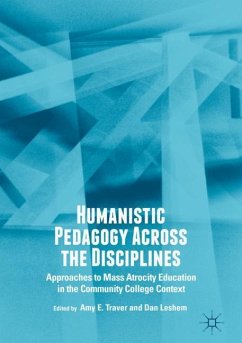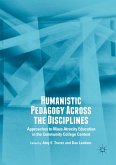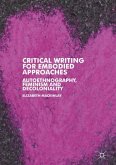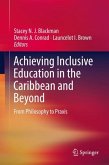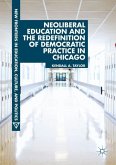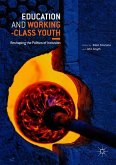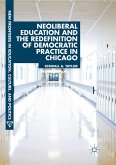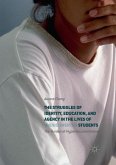Humanistic Pedagogy Across the Disciplines
Approaches to Mass Atrocity Education in the Community College Context
Herausgegeben:Traver, Amy E.; Leshem, Dan
Humanistic Pedagogy Across the Disciplines
Approaches to Mass Atrocity Education in the Community College Context
Herausgegeben:Traver, Amy E.; Leshem, Dan
- Gebundenes Buch
- Merkliste
- Auf die Merkliste
- Bewerten Bewerten
- Teilen
- Produkt teilen
- Produkterinnerung
- Produkterinnerung
This volume presents insights from five years of intensive Holocaust, genocide, and mass atrocity education at Queensborough Community College (QCC) of the City University of New York (CUNY), USA, to offer four approaches-Arts-Based, Textual, Outcomes-Based, and Social Justice-to designing innovative, integrative, and differentiated pedagogies for today's college students. The authors cover the theoretical foundations of each approach, and include faculty reflections on the programs, instructional strategies, and student reactions that brought the approaches to life across the disciplines.
Andere Kunden interessierten sich auch für
![Humanistic Pedagogy Across the Disciplines Humanistic Pedagogy Across the Disciplines]() Humanistic Pedagogy Across the Disciplines70,99 €
Humanistic Pedagogy Across the Disciplines70,99 €![Critical Writing for Embodied Approaches Critical Writing for Embodied Approaches]() Elizabeth MackinlayCritical Writing for Embodied Approaches70,99 €
Elizabeth MackinlayCritical Writing for Embodied Approaches70,99 €![Achieving Inclusive Education in the Caribbean and Beyond Achieving Inclusive Education in the Caribbean and Beyond]() Achieving Inclusive Education in the Caribbean and Beyond77,99 €
Achieving Inclusive Education in the Caribbean and Beyond77,99 €![Neoliberal Education and the Redefinition of Democratic Practice in Chicago Neoliberal Education and the Redefinition of Democratic Practice in Chicago]() Kendall A. TaylorNeoliberal Education and the Redefinition of Democratic Practice in Chicago39,99 €
Kendall A. TaylorNeoliberal Education and the Redefinition of Democratic Practice in Chicago39,99 €![Education and Working-Class Youth Education and Working-Class Youth]() Education and Working-Class Youth93,99 €
Education and Working-Class Youth93,99 €![Neoliberal Education and the Redefinition of Democratic Practice in Chicago Neoliberal Education and the Redefinition of Democratic Practice in Chicago]() Kendall A. TaylorNeoliberal Education and the Redefinition of Democratic Practice in Chicago39,99 €
Kendall A. TaylorNeoliberal Education and the Redefinition of Democratic Practice in Chicago39,99 €![The Struggles of Identity, Education, and Agency in the Lives of Undocumented Students The Struggles of Identity, Education, and Agency in the Lives of Undocumented Students]() Aurora ChangThe Struggles of Identity, Education, and Agency in the Lives of Undocumented Students18,99 €
Aurora ChangThe Struggles of Identity, Education, and Agency in the Lives of Undocumented Students18,99 €-
-
-
This volume presents insights from five years of intensive Holocaust, genocide, and mass atrocity education at Queensborough Community College (QCC) of the City University of New York (CUNY), USA, to offer four approaches-Arts-Based, Textual, Outcomes-Based, and Social Justice-to designing innovative, integrative, and differentiated pedagogies for today's college students. The authors cover the theoretical foundations of each approach, and include faculty reflections on the programs, instructional strategies, and student reactions that brought the approaches to life across the disciplines.
Produktdetails
- Produktdetails
- Verlag: Palgrave Macmillan / Springer International Publishing / Springer, Berlin
- Artikelnr. des Verlages: 978-3-319-95024-2
- 1st ed. 2018
- Seitenzahl: 340
- Erscheinungstermin: 10. Oktober 2018
- Englisch
- Abmessung: 216mm x 153mm x 23mm
- Gewicht: 572g
- ISBN-13: 9783319950242
- ISBN-10: 331995024X
- Artikelnr.: 52710002
- Herstellerkennzeichnung Die Herstellerinformationen sind derzeit nicht verfügbar.
- Verlag: Palgrave Macmillan / Springer International Publishing / Springer, Berlin
- Artikelnr. des Verlages: 978-3-319-95024-2
- 1st ed. 2018
- Seitenzahl: 340
- Erscheinungstermin: 10. Oktober 2018
- Englisch
- Abmessung: 216mm x 153mm x 23mm
- Gewicht: 572g
- ISBN-13: 9783319950242
- ISBN-10: 331995024X
- Artikelnr.: 52710002
- Herstellerkennzeichnung Die Herstellerinformationen sind derzeit nicht verfügbar.
Amy E. Traver is Associate Professor of Sociology at Queensborough Community College (QCC), City University of New York (CUNY), USA. Dan Leshem is the former Executive Director of the Harriet & Kenneth Kupferberg Holocaust Center at QCC, CUNY, USA.
1. Humanistic Pedagogy Across the Disciplines: Approaches to Mass Atrocity Education in the Community College Context.- Part I: Approaches to Mass Atrocity Education in the Community College Context: Theoretical Foundations and Programmatic Examples.- 2. Arts-Based Approaches to Mass Atrocity Education.- 3. Textual Approaches to Mass Atrocity Education.- 4. Outcomes-Based Approaches to Mass Atrocity Education.- 5. Social Justice Approaches to Mass Atrocity Education.- Part II: Approaches to Mass Atrocity Education in the Community College Context: Course-Based Examples.- 6. Students Reflect on the Intersection of Sex, Gender, and Genocide from a Social-Psychological Perspective.- 7. Incarceration through the Lens of Genocide and Restorative Justice.- 8. Dancing to Connect: An Interdisciplinary Creative Arts Approach to Holocaust Education within Liberatory Pedagogy.- 9. Teaching the Holocaust: Making Literary Theory Memorable.- 10. Outcomes of an Academic Service-Learning Project on Mass Atrocity with an ELL Population.- 11. Connecting the Dots: Backward Course Design, Arts Education, and Teaching the Holocaust.- 12. Where History Meets Literature: Teaching the Holocaust, Genocide, and Mass Atrocity Through a Creative Approach in the Community College English Classroom.- 13. Trust No Scorn on the Page and No Hate in the Frame: Deconstructing Hate Speech and Empowering Tolerance in English 101.- 14. "I thought Natives were all living an idyllic country life...": Students Reconsider North American Indigenous Peoples' Lives Through Speech, Gender, and Genocide.- 15. Echoes of Exile: Genocide and Displacement Studies in the Undergraduate Music Curriculum.- 16. Using Campus Resources and Problem-Based Learning to Prepare Students to Become Global Citizens.- 17. The Power of Images: Enhancing Learning Outcomes in a History of Photography Course through an Understanding of Genocide and the Refugee Experience.
1. Humanistic Pedagogy Across the Disciplines: Approaches to Mass Atrocity Education in the Community College Context.- Part I: Approaches to Mass Atrocity Education in the Community College Context: Theoretical Foundations and Programmatic Examples.- 2. Arts-Based Approaches to Mass Atrocity Education.- 3. Textual Approaches to Mass Atrocity Education.- 4. Outcomes-Based Approaches to Mass Atrocity Education.- 5. Social Justice Approaches to Mass Atrocity Education.- Part II: Approaches to Mass Atrocity Education in the Community College Context: Course-Based Examples.- 6. Students Reflect on the Intersection of Sex, Gender, and Genocide from a Social-Psychological Perspective.- 7. Incarceration through the Lens of Genocide and Restorative Justice.- 8. Dancing to Connect: An Interdisciplinary Creative Arts Approach to Holocaust Education within Liberatory Pedagogy.- 9. Teaching the Holocaust: Making Literary Theory Memorable.- 10. Outcomes of an Academic Service-Learning Project on Mass Atrocity with an ELL Population.- 11. Connecting the Dots: Backward Course Design, Arts Education, and Teaching the Holocaust.- 12. Where History Meets Literature: Teaching the Holocaust, Genocide, and Mass Atrocity Through a Creative Approach in the Community College English Classroom.- 13. Trust No Scorn on the Page and No Hate in the Frame: Deconstructing Hate Speech and Empowering Tolerance in English 101.- 14. "I thought Natives were all living an idyllic country life...": Students Reconsider North American Indigenous Peoples' Lives Through Speech, Gender, and Genocide.- 15. Echoes of Exile: Genocide and Displacement Studies in the Undergraduate Music Curriculum.- 16. Using Campus Resources and Problem-Based Learning to Prepare Students to Become Global Citizens.- 17. The Power of Images: Enhancing Learning Outcomes in a History of Photography Course through an Understanding of Genocide and the Refugee Experience.

